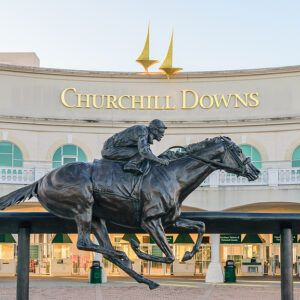Counterpoint: Celebrate Derby Day!

For an opposing point of view see: “Point: Horse Racing’s Reality Problem”
On Saturday, millions of Americans will watch the 149th running of the Kentucky Derby at Churchill Downs — the longest continuously held major sporting event in U.S. history.
In many ways, Derby Day, the first Saturday of May, symbolizes the calendar’s turn from the dark and cold months to the sunshine and warm temperatures that are associated with early May. It is also a cultural cornerstone, as women sport their bonnets, men wear their seersucker suits, and almost everyone sips (or glugs) mint juleps.
In other words, Derby Day is a piece of Americana that ought to be treasured and celebrated.
However, in recent years, the Kentucky Derby has come under scrutiny, primarily due to the tragic events at Santa Anita Park in 2019, in which more than two dozen horses died or had to be euthanized after experiencing fractures. Soon after this sad news, calls to ban horse racing increased. Many Americans began to wonder: Should we still celebrate Derby Day?
The answer is yes, of course, it is still more than OK to celebrate Derby Day because, by and large, horses involved in racing are well cared for, the industry is an economic juggernaut, and believe it or not, horses, like humans, were made to run.
Although those who would like to cancel the Derby (and horse racing in general) would like you to believe that racehorses are treated like commodities, this is not true. In reality, racehorses live idyllic lives courtesy of their human handlers. This includes nurturing relationships with their mothers, a well-balanced diet, pristine living conditions, ample access to veterinary services, and intimate bonds with humans.
In fact, even when their racing careers end, most racehorses maintain their leisurely lives on stud farms or as show horses. Unlike in “Animal Farm,” most do not end up in glue factories.
We should recognize that horse racing is a large industry that provides a huge economic impact. According to the American Quarter Horse Association, the “industry contributes approximately $50 billion in direct economic impact to the country’s economy.”
Moreover, “it directly contributes nearly 1 million jobs and $38 billion in direct wages, salaries and benefits.”
In 2022, the Kentucky Derby alone generated more than $400 million in local economic impact. “It also can be argued that Derby Week also serves as a promotional tool to bring in new residents, investment and businesses to the area,” says Thomas E. Lambert, an economist at the University of Louisville.
Last, it is essential to note that running is as natural to horses as it is to humans. Anecdotally, this was captured in a 2018 Sports Illustrated article titled “Understanding the Kentucky Derby, From a Horse’s Point of View.”
In the article, the author notes that “horses love to run.” And he describes a situation “where the yearlings would instinctively engage each other in impromptu races along the fence lines in their paddocks. Spend a day on racetrack backstretch and you will hear dozens of variations on this theme.”
To be clear, problems remain that need to be solved in horse racing. But that ethos can be applied to nearly all professional sports leagues, whether human-centric or not.
It would be a tragedy to ban horse racing, as many people on the other side of this issue are in favor of doing. Furthermore, if we were to do away with horse racing, wouldn’t we have to also eliminate many other forms of entertainment involving animals?
For nearly a century and a half, the Kentucky Derby has provided the “greatest two minutes in sports” annually. As always, the Run for the Roses will be celebrated this year for its spectacle, splendor and stunning sun hats.
Happy Derby Week, ladies and gentlemen!




